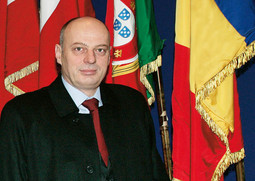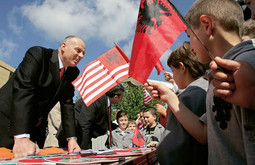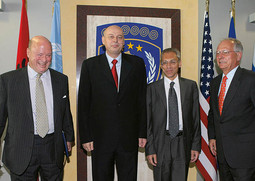Published in Nacional number 631, 2007-12-18
EXCLUSIVE: AGIM ÇEKU
'We expect independence any day now'
The Kosovar Prime Minister, whose mandate is up soon, explains why the international community will recognise that country's independence, and reveals how the Kosovar Government will prevent unrest with the help of KFOR
 A SOLDIER AND A POLITICIAN Agim Çeku became the Kosovar Prime Minister on 10 March 2006. During the war with Serbia, he commanded the Kosovo Liberation Army, and was a Croatian Army officer during the Homeland War The deadline that the international community has given the representatives of Serbia and Kosovo to come to an agreement on the status of Kosovo ran out on 10 December. The two sides cannot come to an agreement because Serbia does not want to renounce territory it considers a part of its country, while the representatives of the Albanians in Kosovo do not accept anything less than the independence of what was once an autonomous province in Yugoslavia. A EU summit was held last week on Kosovo at which it was decided to deploy a EU civilian mission to Kosovo.
A SOLDIER AND A POLITICIAN Agim Çeku became the Kosovar Prime Minister on 10 March 2006. During the war with Serbia, he commanded the Kosovo Liberation Army, and was a Croatian Army officer during the Homeland War The deadline that the international community has given the representatives of Serbia and Kosovo to come to an agreement on the status of Kosovo ran out on 10 December. The two sides cannot come to an agreement because Serbia does not want to renounce territory it considers a part of its country, while the representatives of the Albanians in Kosovo do not accept anything less than the independence of what was once an autonomous province in Yugoslavia. A EU summit was held last week on Kosovo at which it was decided to deploy a EU civilian mission to Kosovo.
We discussed the current situation in Kosovo with Agim Çeku, the 47-year-old Prime Minister whose mandate will soon expire and who is to be replaced at the post of Kosovar Prime Minister by ten year younger Hashim Taqi, the president of the Democratic Party of Kosovo. Çeku was an officer of the Croatian Army during the Homeland War, responsible for artillery, and was wounded but survived the Medak Pocket operation. During the war with Serbia, he was military commander of the Kosovo Liberation Army, and in 1999 he also assumed command of the UN-administered Kosovo defensive troops. Serbia considers him to be a war criminal and Çeku has been arrested twice on the basis of Interpol warrants, once in Slovenia, once in Hungary, but was quickly released thanks to pressure from the UN. He became the Kosovar Prime Minister on 10 March 2006 and after the official swearing-in announced his support of Kosovo independence, promising to protect the rights of the Serbian minority. Çeku is married to a Croatian woman from Zadar with whom he has three children.
NACIONAL: When asked when Kosovo would proclaim independence, your deputy Lufti Haziri gave a press conference held in Pristina last week no decided answer, other than that every day was crucial.
- Exactly. The process finished on 10 December and we expect any day now to agree upon a date. We are working only on the key focus points of agreeing on a date of independence. Last Friday we had a conference of the prime ministers and presidents of the European Mission who agreed on a new EU mission to Kosovo. The new mission pertains to the independence of Kosovo and the implementation of the Ahtisaari proposal and I, as do we all, are expecting to proclaim independence any day now and to have the international community recognise Kosovo. So, it is true that every day is crucial and I do not believe it will drag out too long.
NACIONAL: Would you like to be to one who has the honour of proclaiming independence or will the task fall upon the shoulders of the new Prime Minister Hashim Taqi?
- Of course I would like to be the one, but it will likely be the new Prime Minister. But who it will be is the least important thing. I am very happy to have brought Kosovo from point A to point B at which Kosovo is ready for independence and when the international community is ready to recognise that independence. That was my mission and I can say with pride that it has been carried out.
 THE NATIONAL FLAG In June, Agim Çeku announced a competition for the design of the Kosovo national colours NACIONAL: In an interview for a Kosovo paper you said that you had suffered over the past years because you were hindered and could not achieve much.
THE NATIONAL FLAG In June, Agim Çeku announced a competition for the design of the Kosovo national colours NACIONAL: In an interview for a Kosovo paper you said that you had suffered over the past years because you were hindered and could not achieve much.
- I could not have done more because this time in history was as it was, the priority was getting the status, the status above all. All other actions had to be secondary to that and we had to exercise great caution not to hurt the status. And I am satisfied that we managed to preserve institutional political stability and social stability in Kosovo and that the Government I led only contributed to speeding up the issue of status, there was never cause to dispute or delay the status. Could we have done more? Perhaps, but in these circumstances, when we are addressing the issue of status, at a time when there are intersecting authorities here, starting with UNMIK (the United Nations Mission in Kosovo), the international community which has dictated the tempo of the status, the involvement of the Serbian Coordination Centre for Kosovo, given all these circumstances I am satisfied and, what is more, proud of what we have achieved. The key thing is that I can now report that Kosovo is ready for independence.
NACIONAL: I presume that the proclamation could not go forward earlier because of the great influence of Russia. Have you perhaps led any direct negotiations or discussions with the Russian side?
- Russia is not burdened, it does not have the people of Kosovo or the people of Serbia in mind. It is currently burdened with international rivalry with the European Union and the United States of America, so that they have understood and are slowly sending Russia a message that it is really enough, that Kosovo is an European issue and that Europe must pass a test of its maturity on Kosovo and its ability to address open issues in Europe. I think that the European Union and the USA have decided this time to resolve the issue of Kosovo without the Security Council and without Russia.
NACIONAL: Is there a danger of Russian intervention or military mediation in the event of a proclamation?
- There is no danger of the intervention of Russia, but we are aware that the independence of Kosovo will not go without great challenges, in issues of security, economics and policy. But we have foreseen these challenges and I do not think that they will have a crucial influence on Kosovo.
 NACIONAL: The greatest problem is in the northern part of Kosovo around Kosovska Mitrovica, where the greatest concentration of Serbs live and who boycotted the recent elections. Is the secession of that part of the land an option?
NACIONAL: The greatest problem is in the northern part of Kosovo around Kosovska Mitrovica, where the greatest concentration of Serbs live and who boycotted the recent elections. Is the secession of that part of the land an option?
- It is certainly not an option. The key thing is that Kosovo will be recognised within its actual borders and it is possible that we may for a time have a situation like Croatia had in eastern Slavonia. Perhaps they will try for another "Krajina" scenario and organise unrest. They can try, but they forget a key difference in relation to the situation in Croatia in 1991. NATO, KFOR and the international community are here, with whom we are cooperating closely and with whom we have foreseen all possible scenarios and planned all possible responses. I am confident that UNMIK and the Government of Kosovo will guarantee the rule of law, while KFOR, NATO and our police forces will be a guarantee of our territorial integrity and the freedom of movement in Kosovo.
NACIONAL: In the long term, what is the future of Kosovo in regards to Albania? Does Albania aspire through time to create a federation with Kosovo or is Kosovo explicitly in favour of its own independence in the future too?
- No, Kosovo is explicitly in favour of its own independence, independence in the frame of the European Union. Albania is our neighbour, and a naturally close neighbour with whom we have good relations, but nothing more than good neighbourly relations. I think that in this century there is only one Union and that is the European Union, into which we will all integrate sooner or later. With the integration itself, national borders lose their significance so that that is not a political option. A single state is not the political will either of the people in Albania or the people in Kosovo. I think that it is the political will of all of the nations of this region to integrate into the EU and it is under this roof that we shall find ourselves.
NACIONAL: Can you tell us what your political future will be when your mandate as Prime Minister ends soon?
- I will be at Kosovo's disposal. I do not wish to consider a political future after the status is achieved because the status is now at the centre of my focus. I hope it will be resolved soon. When that issue is resolved and when we become a normal and democratic society, of course I will seek my role in that and remain involved in politics. When and how I shall see when the political scene is structured in Kosovo after our administration is set up.
NACIONAL: Some of the biggest issues for Kosovo are those of the economy. Are you disappointed with the relatively small number of Croatian business people present on the Kosovo market? Did you expect more?
- I did. I think that Croatia should have done much more. I understand the relations between Croatia and Serbia, I understand the caution Croatia is exercising in its approach to Kosovo in regards to Serbia, but I think that Croatia lags behind, say Slovenia and other countries. Kosovo is a very favourable market for Croatian products, for a Croatian presence. Croatia is seen as a winner country, and enjoys an exceptionally high standing in Kosovo, and everything that is Croatian is a winner, is good, is of good quality and welcome. I think Croatia should use this to its advantage. Kosovo is a small market, but a dynamic one, open and with a good perspective.
UN satisfied with Çeku
The election of Agim Çeku for the Kosovar Prime Minister in March of last year was also supported by his predecessor Ramush Haradinaj, who tendered his resignation in early 2005 after the International Criminal Tribunal at The Hague accused him of committing war crimes. By the time his first one hundred days in office had passed, Çeku was commended by the chief of the UN presence in Kosovo, Soren Jessen-Petersen, because he put the implementation of the UN standards for good government and multiethnicity at the heart of his administration.
Latest news
-
28.10.2010. / 14:15
'A profitable INA is in everyone's interest'
-
28.10.2010. / 09:38
Sanader’s eight fear SDP — Won’t bring down Government
-
21.10.2010. / 15:02
Interior Ministry turned a blind eye on Pukanic assassination
-
20.10.2010. / 09:34
Barisic could bankrupt HDZ



